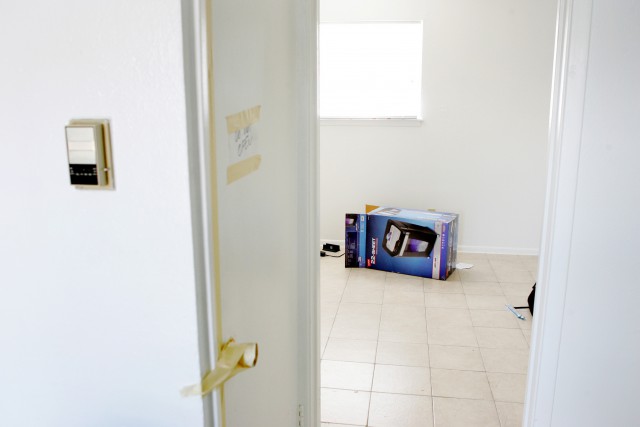
KILLEEN, Texas — Maj. Nidal Malik Hasan’s dingy apartment
holds the odd remnants of a solitary military life, with hints of secrets and
suggestions of terrible plans.
The kitchen of Hasan’s apartment was mostly cleared out. A
neighbor said he gave her frozen food.
Investigators surrendered control of the apartment back to
its owner on Wednesday, nearly a week after the U.S. Army psychiatrist left it
and drove to Fort Hood to attack his fellow soldiers and civilian employees,
killing 13 and wounding 29.
A manager at the Casa Del Norte apartments allowed media
into Hasan’s one-bedroom, upstairs unit shortly after the owner inspected it,
taped one closet shut and left, shaking his head. “The owner feels a
little guilty,” said manager Alice Thompson.
Patricia Villa, a neighbor, said Hasan left his apartment
for the last time about 11 a.m. on Nov. 5, several hours before the attack.
Earlier that morning, the major had brought Villa a large air mattress he had
been using as a bed.
Villa said Hasan told her the day before that he was leaving
for a deployment. He brought her four wooden bookshelves and cheap folding
chairs, three clothes racks and a blue suit, frozen food and a nearly new
microwave. Villa recalled that Hasan told her: “It looks like you need
furniture. I have some stuff. I could help you.”
Federal investigators arrived shortly after the shootings
and sealed off the apartment.
Hasan signed a $300-amonth rental contract and moved into
the gray, two-story complex just after being transferred to Fort Hood from
Walter Reed Army Medical Center in Washington, D.C.
A pile of multiple-choice tests from Hasan’s psychiatric
training sat on one corner of the apartment’s kitchen counter. Topping the pile
was an Oct. 16 letter from a budget insurance company in Austin, confirming
Hasan’s purchase of low-cost auto insurance.
A folding card table near the kitchen was covered in white
plastic and a random scattering of belongings. Some hinted of Hasan’s Arab
roots and Islamic faith: a pile of Jordanian and Israeli coins, an Al
Fajr-brand alarm clock and a white knit skull cap. Beside those items was a
thin paperback book published in India in 1993, Dreams and Interpretations, by
Allamah Muhammed Bin Sireen.
The book’s back cover declares it “a must in every
Muslim home.” Its table of contents promises explanations for 900 dreams —
everything from birth to breastfeeding, from seeing Allah to recognizing his
messengers.
Hasan was born in the U.S. to Palestinian immigrants. Family
members have said his parents weren’t observant Muslims, and Hasan became
increasingly devout after his mother died in 2001.
Other items on the table hinted of Hasan’s professional
aspirations. An Army-green business card bore his name under the heading:
“Behavioral Health. Mental Health. Life Skills.” Beneath Hasan’s
educational titles — medical doctor, psychiatrist, master of public health —
were the letters “SoA (SWT).” Some Islamic Web sites identify those
letters as abbreviations for “Servant of Allah” and a series of
Arabic words that translate into “Glory to Him, the Exalted.” The
business card also bore an AOL e-mail address and a still-working cell phone
number with a Maryland area code.
In the center of the table was clear-plastic packaging from
a Laser Max brand pistol sight. Authorities have said one of the pistols Hasan
used in the attack was outfitted with a red-laser sight. The plastic packaging
in the apartment bore a $229.99 price tag. That is identical to those on Laser
Max pistol sights sold at Guns Galore, a Killeen gun store where authorities
say he purchased the weapons used in the attack.
Hanging on a rack in a closet were a tan-colored,
knee-length Muslim shirt and pants similar to those that Hasan wore when
photographed by security cameras at a convenience store. Clean white underwear
and black socks and other clothing were piled in dryer. The only other articles
of clothing in the apartment were a blue sweatshirt and Army fatigues piled on a
plastic bin near the kitchen.
A Dockers shoebox on top of the dryer was crammed with
bottles of vitamins and drugs. Several bottles held prescription antibiotics
and cough medications issued to Hasan at Walter Reed in 2005. One bottle, still
holding about a dozen pills, had a label stating that the prescription
“Combivir” was issued for Hasan in 2001 at Lackland Air Force Base in
San Antonio.
Combivir was commonly used to treat AIDS at the time. It
also has been prescribed for health care workers who may have been exposed to
the virus in needle sticks.
That prescription bottle had the word “AZT”
handwritten in block letters, a possible reference to another anti-AIDS drug.
Behind the box of medicine, there was an empty bag with a Crown Royal liquor
logo.
Thompson, the apartment manager, said Wednesday was the
first time she had been in the unit since Hasan moved in.
“He just said unless he’s home, he doesn’t want nobody
in that apartment — not unless he’s here,” she said. “I hadn’t heard
of anybody else who lives here saying that, but he just told the owner when he
signed the contract, that that’s how he wanted it.”
Via McClatchy-Tribune News Service.














